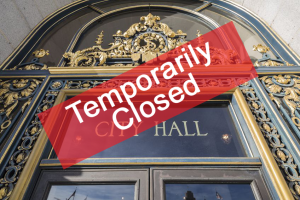As the health crisis continues to spread across the country, cities, counties, and states are trying to proceed as normal. Governments don’t go out of business. When disasters occur, it’s government agencies that have to respond. During the coronavirus crisis, health agencies, along with other emergency personnel, are once again on the front lines and stay on the job.
Governments don’t go out of business
But the nation’s 2.1 million federal employees at federal, state and local levels are slowly shutting down some of their operations, particularly those that engage the public directly.

Many city governments are trying to stay open to focus on basic services and to care for citizens and employees, and city officials are taking extra precautions to limit interaction with the public.
Services and events that are on hold include jury trials, recreation centers, libraries and, in some cases, elections and government offices. Tens of thousands of schools around the country are now shut down.
By mid-March eleven states suspended or postponed their legislative sessions. In addition, the Missouri Senate and Ohio House have postponed their sessions. Other states, including Florida and Kansas, held sessions to pass budgets before allowing legislators to adjourn.
Most legislatures are allowing some staff to work remotely as local governments try to remain largely open for business.
In King County, Wash., which has been one of the communities hardest hit by the virus, numerous in-person services, like making property tax payments, licensing, procurement and in-person job applications and permitting, were closed with the hope of reopening by the end of March.
The Iowa Supreme Court issued an order postponing most jury trials. Criminal trials are postponed until at least April 20 and civil jury trials are postponed until May 4, unless a jury has already been sworn in. Connecticut courts are suspending both criminal and civil cases for 30 days, except those already in progress. New trials are similarly suspended in New York state.
Most state’s departments and divisions of motor vehicles have remained open to the public.
Since being outdoors is safer than congregating in confined spaces indoors with groups of people, most parks around the country remain open. But indoor recreation centers — especially those that serve seniors — are closed in numerous jurisdictions.
The coronavirus has already disrupted campaigns around the country. It may have a permanent effect when it comes to candidates and sponsors of ballot initiatives who have to collect signatures to qualify for the ballot. In Utah, GOP gubernatorial candidate Jeff Burningham has suspended his signature-gathering effort. Dana Balter, a congressional hopeful in New York, has asked Cuomo and state lawmakers to lower the threshold.
“Part of campaigns is canvassing and door-to-door contact has been virtually shut down,” Diana Bray, who has until Tuesday to collect 10,500 signatures to qualify for the U.S. Senate race in Colorado. “Many people are refusing to hold the pen that others have held to sign petitions. Many ask if they can sign my petition online, which they cannot.”
As most local governments try to remain open to focus on services that help citizens, safety is key and decisions to close offices happen quickly so check the city’s website to stay up to date on closures.

